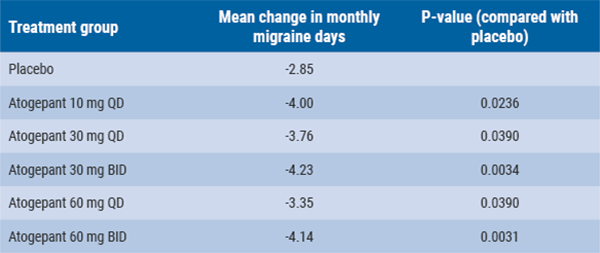Galcanezumab-treated patients with treatment-resistant migraine had clinically meaningful reductions in days with acute headache medication use. In addition, numerically fewer migraine-specific healthcare-professional visits were observed in patients taking galcanezumab in the CONQUER trial [1].
Treatment-resistant migraine is associated with decreased health-related quality of life and increased economic burden. CONQUER was a 3-month double-blind trial with 462 participants. Participants had treatment-resistant episodic or chronic migraine, and had failed 2-4 prior migraine preventive classes due to lack of effectiveness or unacceptable safety/tolerability. At baseline, mean use of acute headache medication was 12.3 days per month. Of all patients, 44.8% had acute headache medication overuse. The percentage of patients reporting migraine-specific healthcare resource utilisation at baseline in the galcanezumab and placebo groups were respectively:
- 40% and 50% healthcare-professional visits (HCP);
- 6% and 5% emergency-room (ER) visits; and
- 2% hospitalisations in both groups.
In the 3-month double-blind study phase, patients received galcanezumab (n=232; 120 mg/month following an initial 240 mg loading dose) or placebo (n=230). An optional 3-month open-label galcanezumab treatment followed.
Medication use
Acute headache medication use was self-reported daily with an e-diary and paper forms. In the double-blind period, mean reduction from baseline in mean use of acute headache medication was greater for the galcanezumab group (3.9–4.5 days) compared to placebo (0.4–1.0 days) in the first 3 months (P<0.001). During the open-label period, reductions from baseline ranged from -4.7 to -5.3 days; prior placebo group reductions were comparable to those observed in galcanezumab. Statistically significant reductions were observed as early as month 1. Reductions were greatest for triptans, followed by NSAIDs and aspirin. Use of ergots, opioids, barbiturates, and anti-nausea medication was very low at baseline in this study population.
HCP and ER visits
Healthcare resource utilisation was reported at baseline (retrospectively for the previous 6 months) and at monthly visits. During the double-blind period, reductions from baseline of migraine-specific HCP visits were numerically greater with galcanezumab than placebo: -215.5 versus -155.3 per 100 person-years. During the open-label period, the prior placebo group reductions (-212.9) were similar to galcanezumab (-222.6). Migraine-specific ER visits decreased by two-thirds at month 3 in the galcanezumab group compared to nearly no reduction in the placebo group. For both groups, migraine-specific ER visits were <13 and hospitalisations were <2 per 100 person-years during the double-blind and open-label period.
- Gómez JP. Effects of galcanezumab on acute medication use and health care resource utilization in patients with treatment-resistant migraine: results from a randomized, double-blind, placebo-controlled clinical trial (CONQUER). MTIS Virtual Symposium 2020, abstract MTV20-DP-035.
Posted on
Previous Article
« Real-world evidence reveals physicians’ perception of erenumab Next Article
No new cardiovascular safety concerns with long-term use of lasmiditan »
« Real-world evidence reveals physicians’ perception of erenumab Next Article
No new cardiovascular safety concerns with long-term use of lasmiditan »
Table of Contents: MTIS 2020
Featured articles
Contents
Improvement of migraine using CGRP mAbs in a real-world setting
Similar treatment needs for high-frequency episodic and low-frequency chronic migraine
Nitroglycerin-induced cluster headache attacks characterised comprehensively
Remote electrical neuromodulation useful for adolescents with migraine
Concomitant preventive medication has no impact on efficacy of ubrogepant
No new cardiovascular safety concerns with long-term use of lasmiditan
Less medication use and fewer doctor visits with galcanezumab in treatment-resistant migraine
Real-world evidence reveals physicians’ perception of erenumab
Early initiation of lasmiditan improves migraine outcomes
Fremanezumab effective in patients with migraine and comorbid depression
Long-term onabotulinumtoxinA improves quality of life in migraine
Sustained shift in migraine status using galcanezumab
Long-term efficacy and safety of fremanezumab in treatment-resistant migraine
Related Articles

July 30, 2019
Atogepant effective and safe for migraine prevention

August 27, 2019
Fremanezumab results of the FOCUS study
© 2024 Medicom Medical Publishers. All rights reserved. Terms and Conditions | Privacy Policy
HEAD OFFICE
Laarderhoogtweg 25
1101 EB Amsterdam
The Netherlands
T: +31 85 4012 560
E: publishers@medicom-publishers.com

